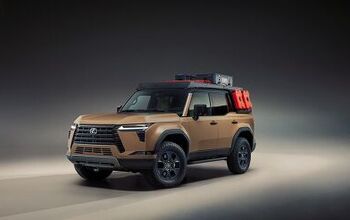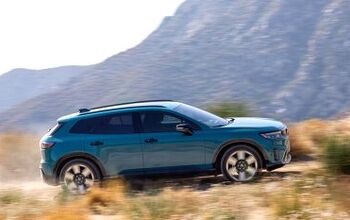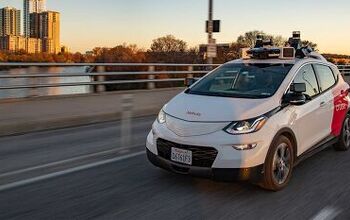Report: Japan May Ban Internal Combustion Vehicles Next Decade

The Japan Broadcasting Corporation, better known as NHK, reported that the island nation is considering banning new internal combustion engine cars by the mid-2030s this week. While we will continue to maintain that such an effort seems unrealistic when confronting the current realities of the market, Japan’s alleged plan offers a bit more leeway than proposals pitched in parts of Europe and North America. Nippon also finds itself in a better position in the preferred mixed approach of allowing mixed powertrains, which would allow the industry to continue production gasoline-driven hybrids.
For starters, the Asian country has a fairly comprehensive hydrogen fueling network thanks to its small size. It’s also in a position that would make nationwide EV charging more feasible than regions with plenty of wide-open spaces. But automakers aren’t making a peep on the issue, preferring to leave it up to regulators and the market.
From Reuters:
The likelihood of state interventions to lower carbon emissions is fueling a technological race among automakers to build electric cars and hybrid gasoline-electric vehicles that will lure drivers as they switch from pure combustion models, particularly in the world’s two biggest auto markets, China and the U.S.
Measures already in place in Japan mean Japanese automakers, particularly big ones such as Toyota with greater research and development resources, could use electric-vehicle technology they have already developed at home.
Nissan COO Ashwani Gupta last month told Reuters his company was ready to respond to Britain’s decision to hasten a phase-out date for new gasoline and diesel-powered cars and vans by five years to 2030 because it was part of a global trend.
That trend? The increasingly ominous “Great Reset” penned by the World Economic Forum. We’ve mentioned it before because it’s one of the most ambitious financial and energy initiatives ever imagined by a hegemony of big tech firms, media conglomerates, pharmaceuticals corporations, automotive giants, financial concerns, the biotech sector, green tech agencies, Amazon, Google, and a slew of other companies that make you wince a little whenever you hear their name. Once thought of as a ludicrous conspiracy held by disenfranchised wingnuts, the Great Reset is now openly endorsed by world leaders and posited as the only way to save the environment. It even has its very own website.
Boiled down, the plan is to digitize/electrify everything by 2030 and ensure economies are restructured so that regular people no longer own anything. While we’re dubious that the working class would tolerate giving up their ownership rights for the presumed health of the planet in a decade’s time (nor are we particularly interested in endorsing such a plan), the global electrification effort seems to be going ahead at full steam.
Japan expects to craft a series of expert panels and run several debates later this month to see what can be done in regard to the automotive sector. It’s assumed it’ll have formal emission targets announced shortly thereafter. China and South Korea have already set stringent emissions goals of their own, though nobody reading this should realistically expect the former nation to adhere to them.
[Image: CAPTAINHOOK/Shutterstock]

A staunch consumer advocate tracking industry trends and regulation. Before joining TTAC, Matt spent a decade working for marketing and research firms based in NYC. Clients included several of the world’s largest automakers, global tire brands, and aftermarket part suppliers. Dissatisfied with the corporate world and resentful of having to wear suits everyday, he pivoted to writing about cars. Since then, that man has become an ardent supporter of the right-to-repair movement, been interviewed on the auto industry by national radio broadcasts, driven more rental cars than anyone ever should, participated in amateur rallying events, and received the requisite minimum training as sanctioned by the SCCA. Handy with a wrench, Matt grew up surrounded by Detroit auto workers and managed to get a pizza delivery job before he was legally eligible. He later found himself driving box trucks through Manhattan, guaranteeing future sympathy for actual truckers. He continues to conduct research pertaining to the automotive sector as an independent contractor and has since moved back to his native Michigan, closer to where the cars are born. A contrarian, Matt claims to prefer understeer — stating that front and all-wheel drive vehicles cater best to his driving style.
More by Matt Posky
Latest Car Reviews
Read moreLatest Product Reviews
Read moreRecent Comments
- Lorenzo Yes, they can recover from the Ghosn-led corporate types who cheapened vehicles in the worst ways, including quality control. In the early to mid-1990s Nissan had efficient engines, and reliable drivetrains in well-assembled, fairly durable vehicles. They can do it again, but the Japanese government will have to help Nissan extricate itself from the "Alliance". It's too bad Japan didn't have a George Washington to warn about entangling alliances!
- Slavuta Nissan + profitability = cheap crap
- ToolGuy Why would they change the grille?
- Oberkanone Nissan proved it can skillfully put new frosting on an old cake with Frontier and Z. Yet, Nissan dealers are so broken they are not good at selling the Frontier. Z production is so minimal I've yet to see one. Could Nissan boost sales? Sure. I've heard Nissan plans to regain share at the low end of the market. Kicks, Versa and lower priced trims of their mainstream SUV's. I just don't see dealerships being motivated to support this effort. Nissan is just about as exciting and compelling as a CVT.
- ToolGuy Anyone who knows, is this the (preliminary) work of the Ford Skunk Works?


































Comments
Join the conversation
The mid 30s is still years away for most of us to be concerned about and in most of the US with the exception of California and the larger states it will be years later before most of us are directly affected by mandates eliminating ICE. Many will have bought several ICE vehicles in the meantime. I am more worried about COVID-19 than what I might drive in another 15 years or more. If I am still driving I might actually want an EV especially if charging becomes more available and the price of EVs becomes more competitive.
I assume that wouldn't include vehicles for export; alternatively, the major Japan manufacturers would probably put the plants manufacturing fossil fuel-powered vehicles in the third-world countries where labor is so much cheaper and emissions regulations are so much lower.